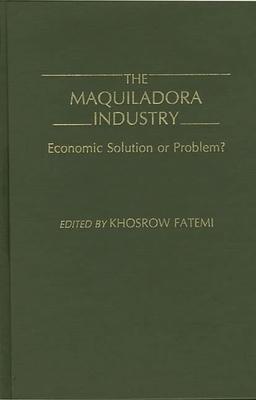Established by the Mexican government in 1965 to provide employment for Mexican citizens in the cities along the U.S. border, the maquiladora program is now one of the fastest growing industries in that area. This pioneering volume presents an in-depth examination of the maquiladora phenomenon written by experts on the subject. The contributors focus on three vital dimensions of the maquiladora issue: the impact of the maquilas on workers and economic development in both the United States and Mexico; the success or failure of the maquilas on an industry by industry basis; and the strategic aspects of the maquiladora program from geopoltical and macroeconomic perspectives. The controversial aspects of the maquilas--their impact on local pollution, unemployment, and labor market exploitation--also receive extended coverage.
Divided into six sections, the volume begins with descriptive essays on the history and current status of maquilas and the special provisions of U.S. and Mexican laws dealing with production sharing. The bulk of the volume is devoted to an analysis of the industry from various perspectives. The contributors examine the impact of maquilas on United States and Mexican border regions; describe the financial issues involved, including debt-equity swaps and other types of foreign investment; explore the use of maquiladoras by non-American countries; and look at the impact of maquiladoras on Mexico's balance of payments. A series of chapters assess the impact of maquilas in particular industries, including the automobile and apparel industries. Finally, the contributors turn toward the future of the maquiladora industry, addressing key issues such as the sociological impact of the maquiladoras, and the managerial issues facing maquiladora executives responsible for training and motivating workers in a multicultural environment. Scholars in Latin American studies, and development economics will find this volume a timely and provocative look at a subject of profound economic significance for both Mexico and the United States.
The Maquiladora Industry: Economic Solution or Problem?
Established by the Mexican government in 1965 to provide employment for Mexican citizens in the cities along the U.S. border, the maquiladora program is now one of the fastest growing industries in that area. This pioneering volume presents an in-depth examination of the maquiladora phenomenon written by experts on the subject. The contributors focus on three vital dimensions of the maquiladora issue: the impact of the maquilas on workers and economic development in both the United States and Mexico; the success or failure of the maquilas on an industry by industry basis; and the strategic aspects of the maquiladora program from geopoltical and macroeconomic perspectives. The controversial aspects of the maquilas--their impact on local pollution, unemployment, and labor market exploitation--also receive extended coverage.
Divided into six sections, the volume begins with descriptive essays on the history and current status of maquilas and the special provisions of U.S. and Mexican laws dealing with production sharing. The bulk of the volume is devoted to an analysis of the industry from various perspectives. The contributors examine the impact of maquilas on United States and Mexican border regions; describe the financial issues involved, including debt-equity swaps and other types of foreign investment; explore the use of maquiladoras by non-American countries; and look at the impact of maquiladoras on Mexico's balance of payments. A series of chapters assess the impact of maquilas in particular industries, including the automobile and apparel industries. Finally, the contributors turn toward the future of the maquiladora industry, addressing key issues such as the sociological impact of the maquiladoras, and the managerial issues facing maquiladora executives responsible for training and motivating workers in a multicultural environment. Scholars in Latin American studies, and development economics will find this volume a timely and provocative look at a subject of profound economic significance for both Mexico and the United States.